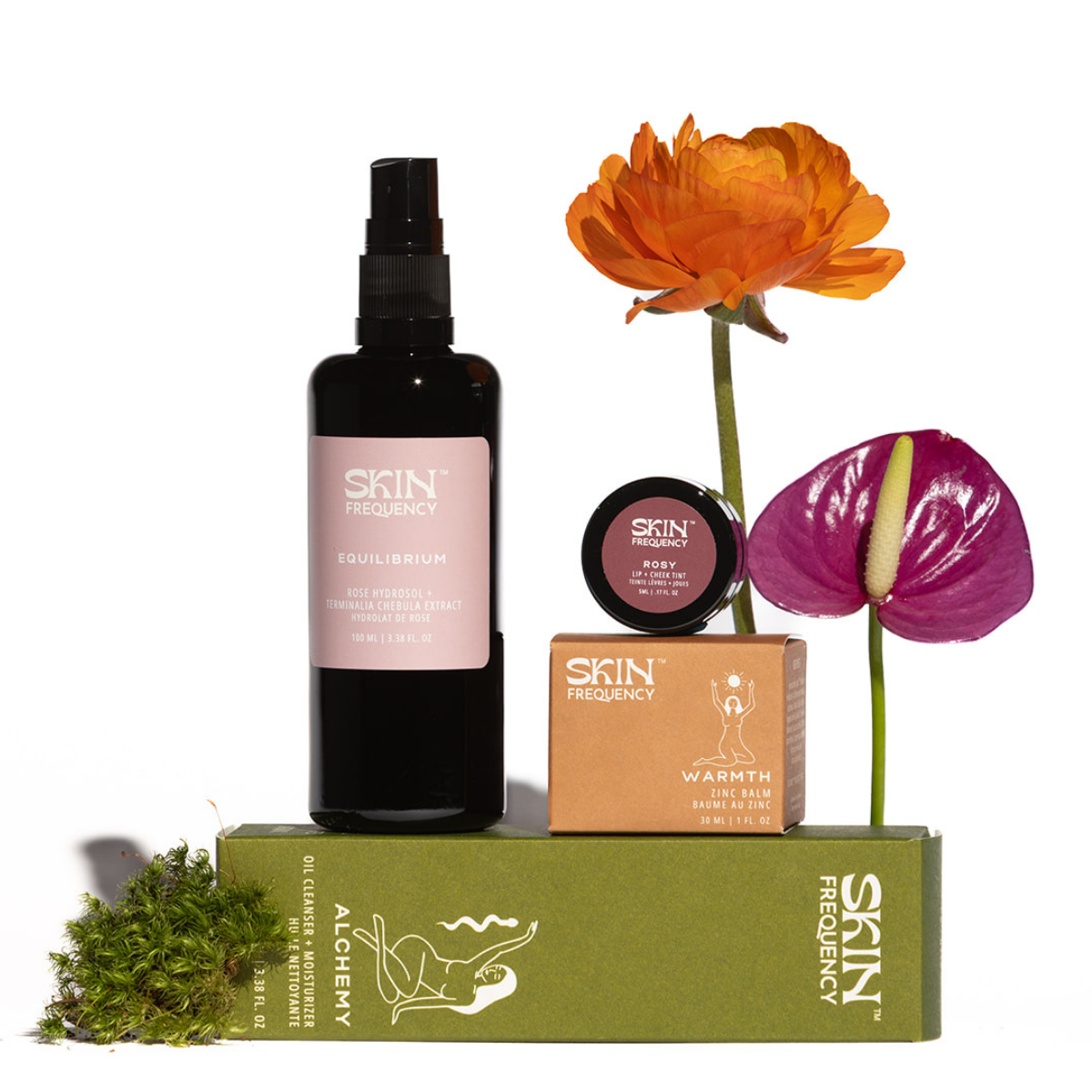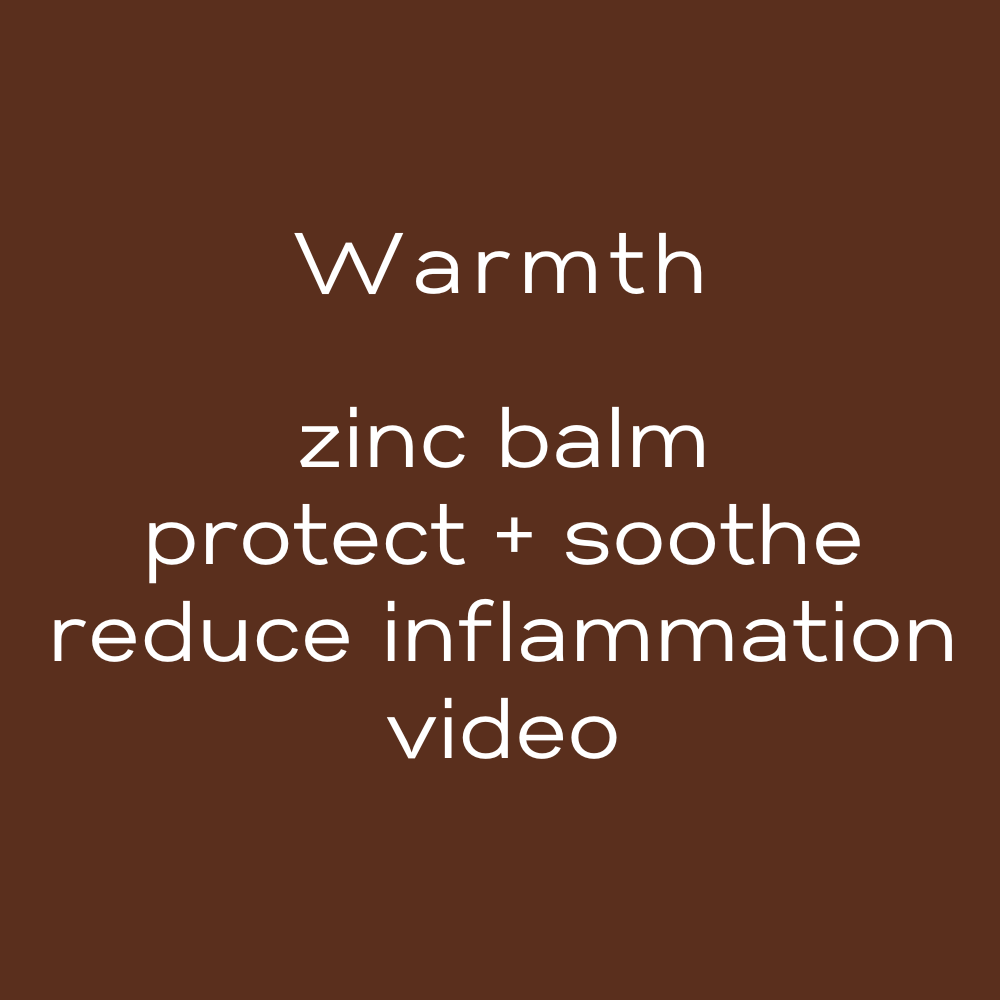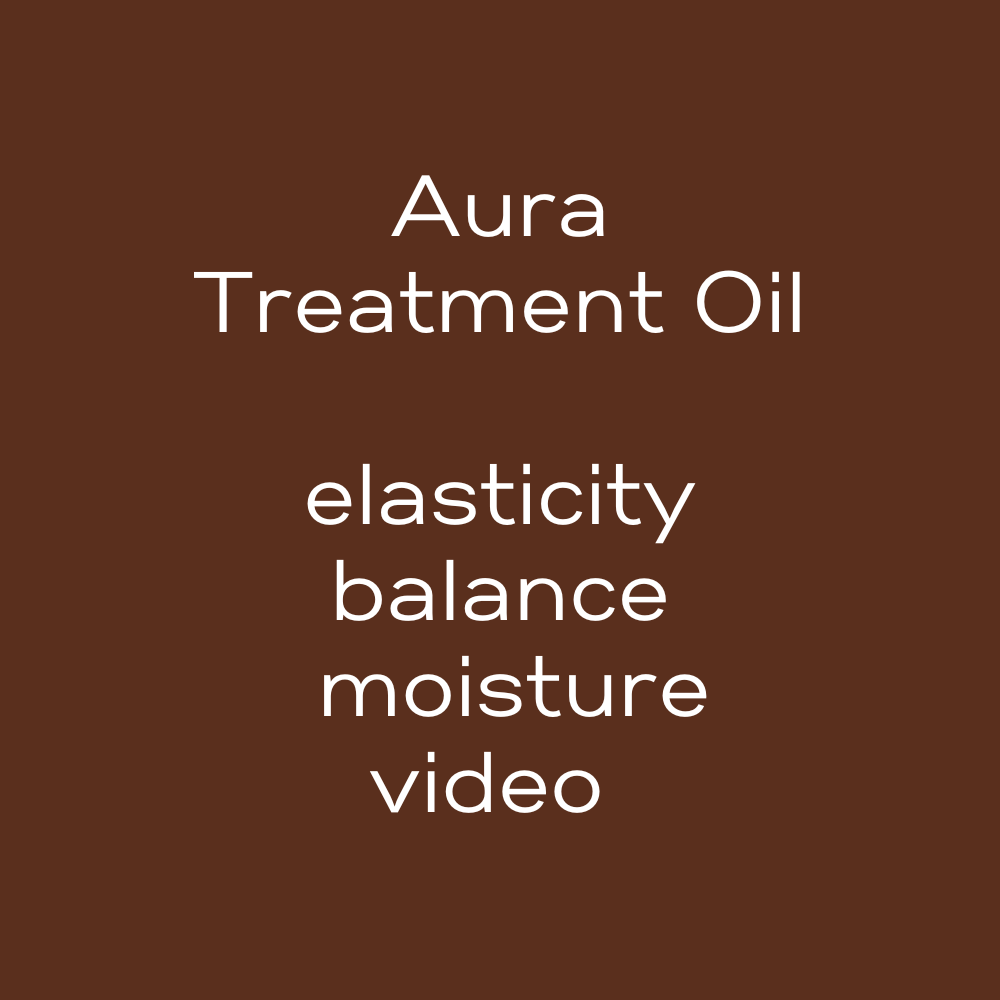
Why We exist
After 20+ years of helping clients with skin concerns, first in medical aesthetics, then through holistic treatments in my studio, I kept seeing the same pattern.
Skin doesn't need more products; it needed less but better.
Through years of studying ingredients and observing how real skin responds, I’ve learned which botanicals and actives truly restore balance and support lasting health.
What Real Results Come From
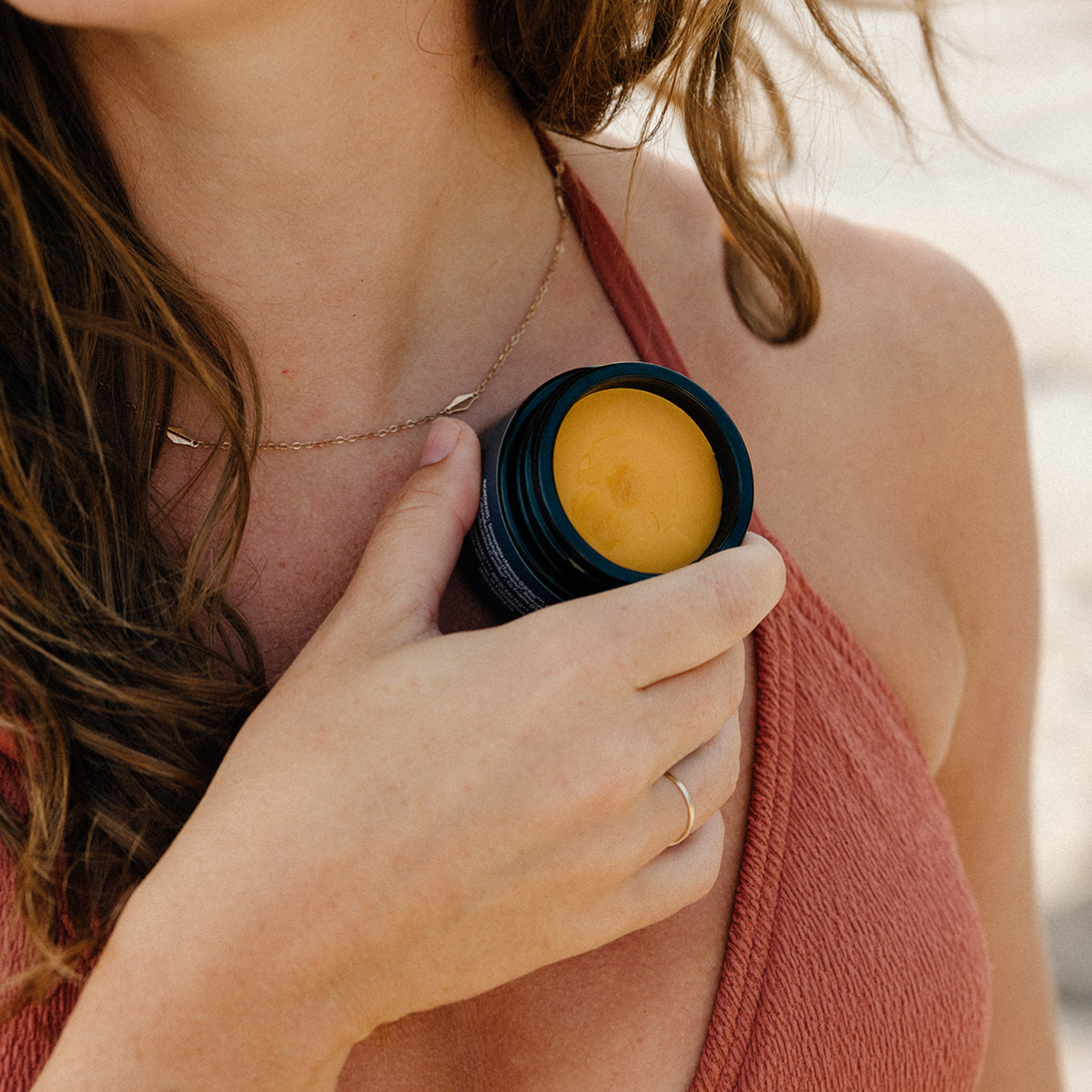
Barrier Repair
A strong barrier keeps moisture in, irritation out, and helps skin stay resilient. Our botanicals replenish essential lipids while zinc and beeswax protect without suffocating the skin.
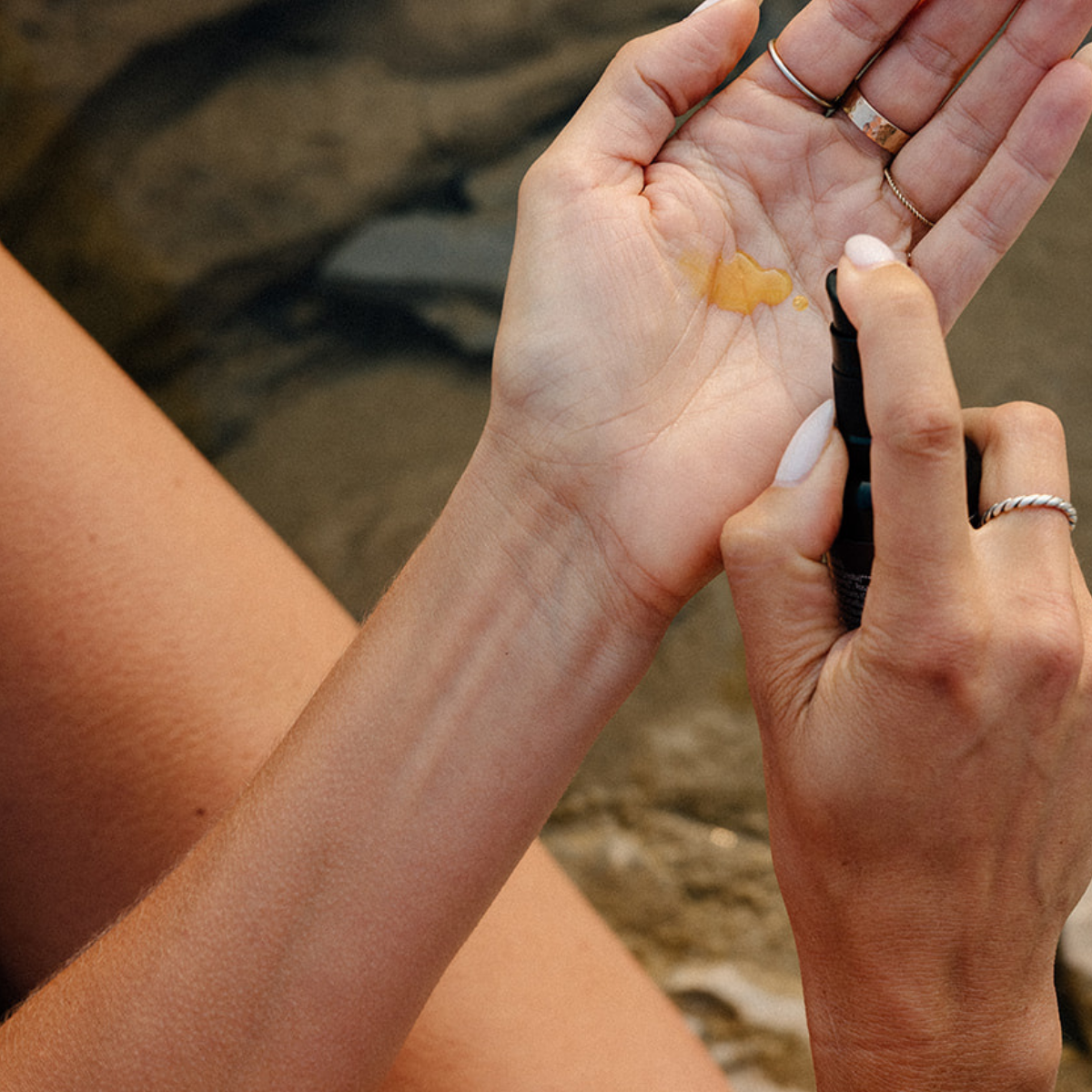
Balance Without Compromise
Every ingredient is selected to replenish deeply without clogging or triggering breakouts. You don’t have to choose between calming and clearing our ingredients are chosen do both, bringing skin back into balance.

Microbiome Health
Skin thrives when its ecosystem is balanced. We avoid common disruptors—fillers, emulsifiers, perfume—and instead choose ingredients that nurture diversity and calm inflammation.

Deep Nourishment
Instead of water or texture agents, our base is pure, skin-compatible botanicals that deliver vitamins, antioxidants, and essential fatty acids your skin recognizes and uses.
Quick Guides
How to Use + Why It Works Product Videos
Our no thanks list
Fillers and synthetics not only dilute the effectiveness of skincare formulations but also clog pores and lead to congestion.
Additionally, these additives can trigger adverse reactions and irritate sensitive skin. By avoiding these substances, we ensure our products are safer and more suitable for all skin types, greatly reducing the risk of allergies and irritation, congestion and breakouts.
It's surprising how many common beauty products include ingredients made from petrochemicals. Some of these are paraffin wax, mineral oil, benzene, and any ingredient that starts with 'PEG' (polyethylene glycol), 'DEA' (diethanolamine), or 'MEA' (ethanolamine). Watch out for words like 'butanol' or anything ending in 'butyl'—such as butyl alcohol, butylparaben, and butylene glycol. Others to avoid include EDTA (ethylenediaminetetraacetic acid), and ingredients starting with 'propyl' like isopropyl alcohol and propylene glycol.
Even 'parfum' or 'fragrance' in your products can be suspect, as they often hide a cocktail of undisclosed chemicals, some of which may disrupt hormones.
These ingredients are not just common in skincare and cosmetics; they're also concerning for both health and the environment.
Perfume and fragrance in skincare products can impact more than just the surface of your skin; they can also influence your body's endocrine system. These additives often contain phthalates and other chemicals known to disrupt hormones. When absorbed through the skin or inhaled, these substances can mimic natural hormones, leading to potential imbalances. This disruption can affect various bodily functions, from metabolism to reproductive health. This one ingredient listed can house thousands of irritating and hormone disrupting chemicals.
Preservatives can disrupt the skin’s natural microbiome. They can eliminate beneficial bacteria, weakening the skin’s protective barrier and making it more prone to dryness, irritation, and infections. By formulating water-free products, we avoid the need for preservatives altogether, thereby maintaining the natural balance and health of your skin's microbiome.
Preservatives like sodium benzoate are often used in clean skincare to prevent bacterial growth and extend shelf life. While generally considered safe, sodium benzoate when mixed with vitamin C can produce benzene, a known carcinogen. Therefore, if you use products containing both sodium benzoate and vitamin C, you might unknowingly create a harmful substance directly on your skin.
Emulsifiers are commonly used in skincare products to blend oil and water-based ingredients. While they are effective at maintaining product consistency, emulsifiers can also disrupt the skin’s natural barrier.
They work by breaking down the skin’s protective lipid layer, which can lead to moisture loss and increased skin sensitivity. This disruption can make the skin more vulnerable to external irritants and pathogens, potentially leading to dryness, irritation, and a weakened defense against environmental stressors.
Sulfates are prevalent in about 90% of foaming and lathering products, including many skincare and hair care items. Despite being frequently labeled as 'comes from' or 'derived from' coconut to appear benign, sulfates are significant skin irritants. They can strip the skin of its natural oils, leading to dryness, irritation, and even breakouts. Beyond these immediate skin concerns, sulfates also disrupt hormonal balance and are suspected to be endocrine disruptors
Studies have shown that surfactants can have detrimental effect on skin. Surfactants dissolve the skin’s natural ceramides, enzymes, and the hydro-lipid barrier which are essential for maintaining skin health and moisture.
Found in products like foaming washes, suds, and scrubs, surfactants can penetrate the top layer of the skin and remain there even after rinsing. This lingering presence can initiate chronic irritation, disrupt the skin's natural protective barrier, and lead to increased dryness and sensitivity over time.
Parabens are widely used as preservatives in cosmetic and skincare products. They can have several adverse effects on the skin. Parabens are known to disrupt hormone function by mimicking estrogen, which can lead to hormonal imbalances and impact skin conditions, exacerbating issues like hormonal acne. Additionally, parabens can weaken the skin’s natural barrier, making it more susceptible to irritation, dryness, and environmental damage.
Look for the prefixes ethyl-, methyl-, propyl-, isopropyl-, butyl- or isobutyl on the label.
Alcohol in skincare can have several adverse effects. It can strip the skin of its natural oils and moisture, leading to dryness and irritation. This not only compromises the skin's barrier function but also makes it more susceptible to environmental stressors. For those with sensitive or dry skin, alcohol can exacerbate redness, inflammation, and overall sensitivity.
Alcohol-based products can disrupt the delicate balance of the skin's microbiome, a crucial component in maintaining skin health and immunity. This disruption can weaken the skin's natural defenses, making it harder to protect itself effectively.
Hydrogenated vegetable oils are commonly used in clean skincare as a cheap alternative to natural oils because they last longer and cost less. However, they don't offer the same skin benefits as unprocessed, natural oils.
Hydrogenated oils can also hold onto chemicals and impurities from their processing, which might irritate the skin or cause allergic reactions, particularly in people with sensitive or reactive skin types.
We love using coconut oil in our cooking for its great taste and health benefits. But when it comes to skincare, we're a bit more careful. Coconut oil can clog pores because it has a high comedogenic rating. That means it might not be the best choice for applying to the skin, especially if you have oily or acne-prone skin, as it could lead to breakouts.
When searching for skincare products, it can be challenging to find options that don't contain common humectants like glycerin and hyaluronic acid.
Although it might seem unusual to exclude these ingredients, we have explored some of their potential drawbacks.
Both glycerin and hyaluronic acid are designed to draw moisture from the environment to hydrate the skin. However, this process can inadvertently pull pollutants and free radicals from the air onto the skin, which may lead to irritation and accelerate the aging process.
Additionally, in low-humidity environments, these humectants can draw moisture from the deeper layers of the skin, causing transepidermal water loss, dryness, and further irritation.
As an alternative approach to achieve hydration and moisture without any downsides, we recommend misting your skin with a hydrosol, while it is still damp the application of botanical ingredients like beeswax, jojoba oil, and tamanu oil lock in hydration.
This method provides benefits without drawbacks, ensuring optimal hydration and nourishment for your skin while minimizing exposure to environmental pollutants and cellular water depletion.
While hyaluronic acid (HA) is naturally present in our skin and renowned for its ability to retain moisture, not all HA in skincare products delivers the promised benefits.
The claim that it can hold 1000 times its weight in water refers to native HA found within our skin, not necessarily the formulations in jars.
Paradoxically, some products containing hyaluronic acid (HA) might actually work against skin hydration. Although HA is known for its ability to hold water, in certain conditions it can draw moisture away from the skin instead of pulling it in. This can lead to trans epidermal water loss, where the skin ends up drier than before.

OUR GODDESS GAL
In a world that often tells us we need more to be complete, our liberated goddess embraces the opposite. She is free and content, she is perfect just as she is.
Skin Frequency vs. Conventional Skincare
- Replaces foaming or cream cleansers.
As a body moisturizer:
- Replaces lotions and creams.
When to use it:
- For cleansing use morning and night. as a body oil apply after bathing.
How to use it as a cleanser:
- Apply 3-5 pumps to dry skin.
- Massage gently to break down makeup, sunscreen, and impurities.
- Remove with a warm, damp cloth—no harsh scrubbing needed.
Why it’s different:
- Most conventional cleansers and lotions rely on harsh surfactants, emulsifiers, and preservatives that can disrupt the skin’s natural barrier.
- Replaces foaming or cream cleansers.
As a body moisturizer:
- Replaces lotions and creams.
When to use it:
- For cleansing use morning and night. as a body oil apply after bathing.
How to use it as a cleanser:
- Apply 3-5 pumps to dry skin.
- Massage gently to break down makeup, sunscreen, and impurities.
- Remove with a warm, damp cloth—no harsh scrubbing needed.
Why it’s different:
- Most conventional cleansers and lotions rely on harsh surfactants, emulsifiers, and preservatives that can disrupt the skin’s natural barrier.
- Replaces conventional toners and essences.
- Hydrates, soothes, and balances the skin’s pH.
- Prepares the skin for better absorption of oils and balms.
Morning & Night
- after cleansing to hydrate and prep the skin.
- Can also be used throughout the day as a refreshing mist.
Why it’s different:
Most toners contain alcohol, preservatives, or unnecessary additives that can dry out or irritate the skin.
- Replaces harsh scrubs and acid-based exfoliants.
- Gently smooths rough skin and helps fade dark spots.
- Clears clogged pores without drying or irritating the skin.
When to use it: Use at night, 1-3 times a week after cleansing. Leave it on overnight and apply a balm on top.
Why it’s different: Most exfoliants use strong acids or rough scrubs that can leave skin red, dry, or sensitive.
- Replaces rich creams and heavy moisturizers.
- Deeply nourishes and calms sensitive or stressed skin.
- Locks in moisture and supports a healthy skin barrier.
Morning & Night apply to freshly misted skin.
Why it’s different:
Most creams contain fillers, preservatives, and emulsifiers that can clog pores or disrupt the skin barrier.
- Replaces retinol and vitamin C serums.
- Supports collagen production and improves skin elasticity.
- Helps fade dark spots, smooth fine lines, and even skin tone.
Use it in the Morning: after misting, on damp skin.
Why it’s different:
Most retinol and vitamin C serums can not be combined and contain harsh unstable formulas that can cause irritation. Immortal uses a stable oil-based vitamin C and a non-sensitizing retinol alternative
Replaces traditional creams
- Deeply hydrates and locks in moisture without feeling heavy.
- Protects the skin with non-nano zinc, a physical barrier against the sun and a natural anti-inflammatory.
Morning: Apply after misting for all-day moisture and protection.
Night: Use a thicker layer to soothe irritation, calm redness, and restore dry skin overnight.
Why it’s different:
Most creams are up to 80% water, requiring preservatives and emulsifiers. Warmth is a concentrated balm, meaning you get more benefits with less product. No fillers, no unnecessary ingredients.
Replaces thick creams and overnight masks.
- Deeply nourishes, softens, and repairs dry, sensitive, or compromised skin.
- Forms a protective layer to lock in moisture and calm irritation.
Use it at Night: Apply after misting as the final step to restore and strengthen the skin barrier while you sleep.
Why it’s different:
Most creams are mostly water and rely on preservatives and emulsifiers that don’t truly repair the skin. Abundance is a concentrated balm, packed with pure, healing ingredients to deeply moisturize, soothe, and restore
Replaces thick creams and medicated healing balms.
- Deeply hydrates and repairs dry, compromised, or irritated skin.
- Forms a breathable protective layer to lock in moisture and soothe sensitivity.
Use at Night:
- Apply as the final step to calm, soften, and restore the skin barrier overnight.
- Can also be used on dry patches or areas needing extra care anytime.
Why it’s different:
Most creams contain up to 80% water, requiring preservatives and emulsifiers that don’t truly heal the skin. Enrich is a concentrated balm, delivering pure nourishment with healing botanicals—no fillers, no synthetic additives, just deep, lasting hydration.
Replaces foaming cleansers, clay masks, and exfoliating scrubs.
- Gently cleanses, exfoliates, and detoxifies without stripping the skin.
- Balances oil production while supporting the skin’s microbiome.
Morning or Night:
- 1-3 times a week As a cleanser, mix with water and use daily or as needed.
- 1-3 times a week: As a mask, leave on for a few minutes before rinsing for a deeper detox.
Why it’s different:
Most cleansers and masks contain harsh surfactants, preservatives, or over-drying clays that disrupt the skin’s balance. Purify is a concentrated, water-activated powder, made with pure botanicals and minerals to cleanse, exfoliate, and clarify, without irritation.
Replaces conventional cream blush and tinted lip balms.
- Moisturizes while adding a natural, buildable flush of color.
- Made with pure botanical pigments—no synthetic dyes or fragrances.
When to use it:
Morning: Apply to lips and cheeks for a natural glow.
Throughout the day: Reapply as needed for extra hydration and color.
Why it’s different:
Most tints contain petroleum, synthetic dyes, and artificial fragrances that can dry out the skin. Rosy is a botanical-based balm, giving your lips and cheeks hydration, nourishment, and a soft, natural tint—all in one.

